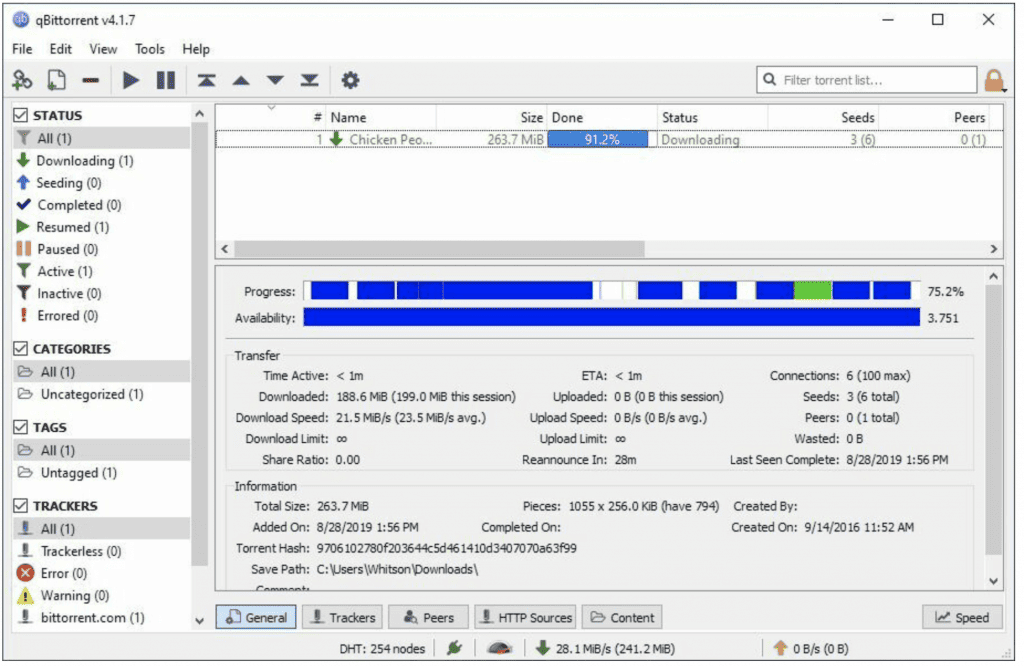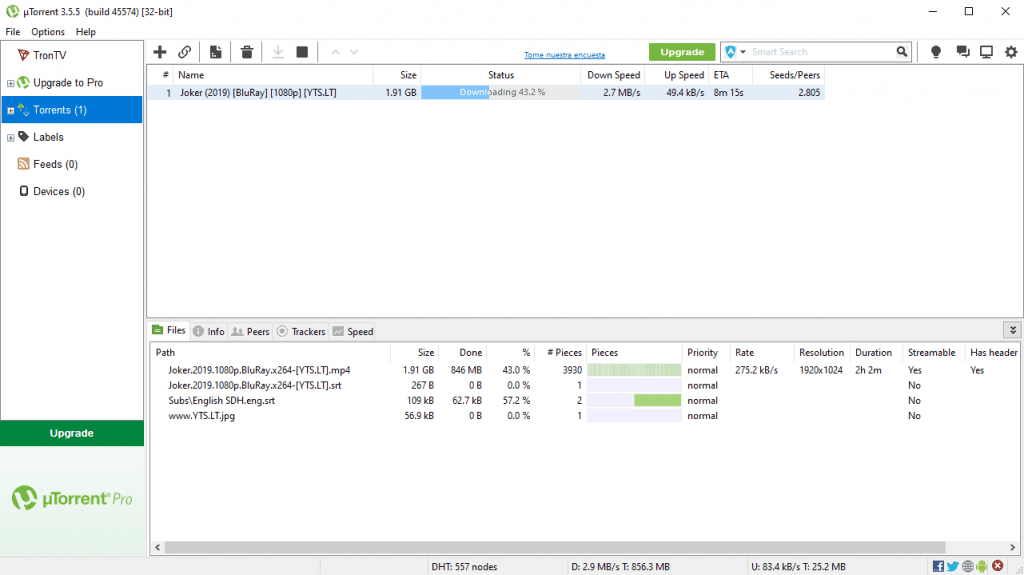Introduction
Every user who downloads or shares files over the internet knows about torrent clients. In the vast ecosystem of these clients, two names stand out: BitTorrent and uTorrent. These applications, highly popular and frequently used by a vast number of users worldwide, are often placed head-to-head due to their similarities and differences. In this comprehensive review, we will put these two under the microscope, highlight their technical features, and identify their pros and cons to help you make an informed choice about BitTorrent vs uTorrent.
FAQ
1.What is the main difference between BitTorrent vs uTorrent?
The main difference between BitTorrent and uTorrent lies in their size and resource consumption. BitTorrent is larger and consumes more resources, while uTorrent is lighter and uses less of your computer’s resources.
2. Is there a speed difference between BitTorrent and uTorrent?
The speed difference between BitTorrent and uTorrent isn’t significant and mostly depends on the user’s internet connection, the number of seeders, and the quality of the torrent file.
3. Are BitTorrent and uTorrent safe to use?
Yes, both BitTorrent and uTorrent are safe to use. However, users should be aware of potential legal issues related to the downloading of copyrighted materials.
4. Is it legal to download files through a torrent?
Yes, downloading files through torrenting in itself is not illegal. However, downloading copyrighted materials without permission from the owner is illegal in many jurisdictions. Therefore, it is crucial to use torrenting responsibly and ensure that you are not infringing on anyone’s copyrights.
5. What does seeding mean in the context of torrenting?
Seeding refers to the process of sharing the downloaded files with other users in the torrent community. When you seed a torrent, you are essentially acting as a server, allowing others to download pieces of the file from you. The more seeders a torrent has, the faster the download speed typically is for everyone.
6. What are torrent trackers?
A torrent tracker is a server that assists in communication between peers using the BitTorrent protocol. It helps users find other peers who are downloading or seeding the same file, enabling a faster and more efficient download process.
7. Can my ISP know if I’m using torrents?
Yes, unless you’re using a Virtual Private Network (VPN), your Internet Service Provider (ISP) can see your online activity, including if you’re downloading torrents. Some ISPs may throttle your internet speed if they detect torrenting, which is why using a VPN for torrenting is generally recommended to maintain privacy and unrestricted speeds.
8. Can I get a virus from torrenting?
There’s a risk of downloading malicious files or software when using torrents, especially from unverified sources. It’s essential to use reliable and well-reviewed torrent sites, check the comments for any user warnings before downloading a torrent, and always have an up-to-date antivirus software installed on your device.
BitTorrent

BitTorrent is a peer-to-peer (P2P) file sharing protocol that allows users to distribute data and electronic files over the internet in a decentralized manner. Essentially, this protocol breaks down files into smaller parts, allowing users to upload and download different pieces simultaneously from different sources. It’s incredibly efficient, making the download process faster and more manageable.


Pros
- Efficient Bandwidth Use: BitTorrent employs a tit-for-tat strategy that promotes cooperation among peers. This feature ensures optimal bandwidth use and fast download speeds.
- Integrated Search Feature: Unlike many torrent clients, BitTorrent comes with an integrated search feature. This feature simplifies the search process, making it convenient for users to find and download files. Rather than juggle between torrent search websites and the client, users can perform all their actions within the client itself. It’s a simple yet powerful feature that enhances the user experience.
- RSS Feed Support: BitTorrent also offers RSS feed support. This feature allows users to automate their downloads, thereby providing a seamless torrenting experience. With this feature, you don’t have to manually keep track of your favorite content; BitTorrent handles it all for you.
- Remote Management: Users can manage their BitTorrent client remotely via a web-based interface. This feature adds an extra layer of convenience, allowing users to handle their downloads from any location.
- Sequential Downloading: BitTorrent allows sequential downloading. This feature is handy for users who want to preview video or audio files before they are completely downloaded.
Cons
- Ad Presence: One major downside of BitTorrent is the presence of ads. Though they help keep the client free, they can be intrusive and interrupt the user experience.
- Resource Heavy: BitTorrent is known to consume more resources, which may slow down other activities on your computer.
- No Built-in VPN: Unlike some torrent clients, BitTorrent doesn’t come with a built-in VPN, potentially exposing users to risks if they don’t take extra steps to secure their connection.
uTorrent

uTorrent, a subsidiary of BitTorrent, is another highly popular torrent client. While it operates on the same basic principles as BitTorrent, there are notable differences.


Pros
- Lightweight: uTorrent is renowned for being a lightweight client, using minimal computer resources. This feature is especially beneficial for users with older or low-end devices.
- RSS Feed and Scheduler: Just like BitTorrent, uTorrent supports RSS feeds and has a built-in scheduler. These features can automate downloads and manage them at specific times to save on bandwidth during peak hours.
- Customizable Interface: uTorrent’s interface is highly customizable. Users can modify it to suit their tastes and needs, which adds a unique personal touch to the experience.
- Remote Control via HTTP Protocol: This feature allows users to manage their uTorrent client from anywhere, providing great flexibility and convenience.
- Unicode support and Skinnable: uTorrent supports Unicode for those who need to use non-English characters. It is also skinnable, which means you can change the look and feel of the user interface.
- Sequential downloading feature is an absolute lifesaver for users who like to preview their media files before the download finishes. It ensures that you don’t have to wait for a complete download to start enjoying your content.
Cons
- Ads: Like BitTorrent, uTorrent also comes with ads. The downside is the potential to disrupt user experience.
- Cryptocurrency Miner: In the past, uTorrent faced backlash for including a hidden cryptocurrency miner in the software, negatively impacting its reputation.
- Limited Search Functionality: Unlike BitTorrent, uTorrent’s search functionality is limited, which can make finding specific files somewhat more challenging.
The Final Showdown: BitTorrent vs uTorrent?
In the showdown between BitTorrent and uTorrent, the outcome boils down to the user’s personal preference. Both offer impressive features and robust functionality. BitTorrent, with its integrated search and efficient bandwidth use, offers a full package, albeit at the cost of more resources. On the other hand, uTorrent shines in its lightness and user-friendly customization options.
However, both do suffer from the presence of ads and lack of a built-in VPN. Therefore, your decision may hinge on whether you prioritize a feature-packed client that uses more resources (BitTorrent) or a lightweight, less demanding one with limited search capabilities (uTorrent).
In Summary
Both BitTorrent vs uTorrent stand as powerful contenders in the realm of torrent clients, each offering unique benefits. BitTorrent is ideal for users seeking comprehensive features and who don’t mind it being resource-heavy. In contrast, uTorrent’s appeal lies in its lightweight nature, optimal for users with lower-end devices. Despite some drawbacks, such as ad presence and limited search functionality, both clients provide a solid, efficient, and user-friendly torrenting experience. Your final choice between BitTorrent and uTorrent will thus depend on your individual needs, preferences, and the specific demands of your device.

